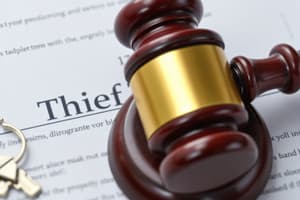Podcast
Questions and Answers
What constitutes a crime under Section 132(1) of the Criminal Code?
What constitutes a crime under Section 132(1) of the Criminal Code?
Destroying or damaging another's property without lawful excuse, intending to do so or being reckless about the damage.
How is a crime of arson defined under Section 132?
How is a crime of arson defined under Section 132?
A crime committed by destroying or damaging property by fire or explosive matter.
What are the potential penalties for someone convicted of arson according to Section 135?
What are the potential penalties for someone convicted of arson according to Section 135?
Imprisonment for life on indictment or up to five years on summary conviction.
What does Section 133 state about threats related to property damage?
What does Section 133 state about threats related to property damage?
What constitutes intent under Section 134 regarding custody of items for property damage?
What constitutes intent under Section 134 regarding custody of items for property damage?
What does Section 132(2) describe regarding the recklessness related to life endangerment?
What does Section 132(2) describe regarding the recklessness related to life endangerment?
What is the maximum penalty for committing any other offense under this Title as stated in Section 135?
What is the maximum penalty for committing any other offense under this Title as stated in Section 135?
Under Section 135, what implications does a summary conviction carry in relation to other offenses?
Under Section 135, what implications does a summary conviction carry in relation to other offenses?
What two key elements must be established for property protection under the discussed section?
What two key elements must be established for property protection under the discussed section?
How does the section view a belief regarding the need for property protection?
How does the section view a belief regarding the need for property protection?
What types of property are included in the definition of 'property' as per this section?
What types of property are included in the definition of 'property' as per this section?
What is stated about the status of wild creatures under the property definition?
What is stated about the status of wild creatures under the property definition?
Which items are explicitly excluded from the property definition in this section?
Which items are explicitly excluded from the property definition in this section?
In terms of ownership, how is property treated when it relates to a person?
In terms of ownership, how is property treated when it relates to a person?
If property is subject to a trust, who is considered to have rights to it?
If property is subject to a trust, who is considered to have rights to it?
How is corporate property viewed under this section?
How is corporate property viewed under this section?
What legal discretion does the Director of Public Prosecutions have regarding arson charges under section 132(3)?
What legal discretion does the Director of Public Prosecutions have regarding arson charges under section 132(3)?
Which crimes are covered under section 136?
Which crimes are covered under section 136?
Under what condition can a person charged with a crime under section 136 be treated as having a lawful excuse?
Under what condition can a person charged with a crime under section 136 be treated as having a lawful excuse?
What scenario must a person charged with a crime under section 136 believe in order to claim a lawful excuse?
What scenario must a person charged with a crime under section 136 believe in order to claim a lawful excuse?
What does section 136 (2) clarify about individuals charged with relevant crimes?
What does section 136 (2) clarify about individuals charged with relevant crimes?
What must a person demonstrate if they destroy or damage property under section 136?
What must a person demonstrate if they destroy or damage property under section 136?
In section 136, what is stated about threats involving endangerment to life?
In section 136, what is stated about threats involving endangerment to life?
What is the implication of believing one has a right to consent for crimes under section 134?
What is the implication of believing one has a right to consent for crimes under section 134?
Flashcards
Criminal Damage (Section 132)
Criminal Damage (Section 132)
Destroying or damaging another's property without lawful excuse, intending to do so or being reckless about the outcome
Criminal Damage – Endangering Life (Section 132(2))
Criminal Damage – Endangering Life (Section 132(2))
Damage or destruction with intent, or recklessness, in putting others at risk of harm, whether you own the property or not
Arson (Section 132(3))
Arson (Section 132(3))
Criminal damage using fire or explosives
Threatening Damage (Section 133)
Threatening Damage (Section 133)
Signup and view all the flashcards
Criminal Damage with Instrument (Section 134)
Criminal Damage with Instrument (Section 134)
Signup and view all the flashcards
Arson Penalty (Section 135(1))
Arson Penalty (Section 135(1))
Signup and view all the flashcards
General Damage Penalty (Section 135(2))
General Damage Penalty (Section 135(2))
Signup and view all the flashcards
Other Damage Penalty (Section 135(3))
Other Damage Penalty (Section 135(3))
Signup and view all the flashcards
Section 136 Protection
Section 136 Protection
Signup and view all the flashcards
Honest Belief
Honest Belief
Signup and view all the flashcards
Property Interest
Property Interest
Signup and view all the flashcards
Property Definition (Section 137)
Property Definition (Section 137)
Signup and view all the flashcards
Property Ownership (Section 137)
Property Ownership (Section 137)
Signup and view all the flashcards
Trust Property (Section 137)
Trust Property (Section 137)
Signup and view all the flashcards
Corporate Property
Corporate Property
Signup and view all the flashcards
Exclusions from Property (Section 137)
Exclusions from Property (Section 137)
Signup and view all the flashcards
Section 132(3) arson trial
Section 132(3) arson trial
Signup and view all the flashcards
Section 136 applicability
Section 136 applicability
Signup and view all the flashcards
Section 136 - lawful excuse (consent)
Section 136 - lawful excuse (consent)
Signup and view all the flashcards
Section 136 - lawful excuse (protection of property)
Section 136 - lawful excuse (protection of property)
Signup and view all the flashcards
Section 136 - legal excuse: belief of consent
Section 136 - legal excuse: belief of consent
Signup and view all the flashcards
Section 136 - crime exclusions
Section 136 - crime exclusions
Signup and view all the flashcards
Crime under Section 134
Crime under Section 134
Signup and view all the flashcards
Summary Trial
Summary Trial
Signup and view all the flashcards
Study Notes
Criminal Code Chapter 101, Part 3: Offences Against Property
-
Section 132:
- Destroying or damaging another's property without lawful excuse is a crime.
- Includes intending to destroy/damage or being reckless about whether property would be destroyed/damaged.
- If the destruction/damage is intended to endanger another's life or is reckless regarding that life, the crime is more serious.
- Destroying/damaging property by fire or explosives is considered arson.
-
Section 133:
- Threatening to destroy/damage another's or a third party's property, intending the threat will be carried out, is a crime.
- Includes threatening to damage one's own property in a way that endangers another.
-
Section 134:
- Using or allowing someone else to use property under your control, intending to destroy/damage another's property, or to endanger another's life, is a crime.
-
Section 135:
- Arson (chargeable under section 132(3)) is liable to:
- Imprisonment for life (indictment)
- Imprisonment for up to 5 years (summary conviction)
- Other offences under section 132(2): Imprisonment for life.
- Other offences under this title are liable to:
- Imprisonment for up to 10 years (indictment)
- Imprisonment for up to 5 years (summary conviction)
- Offences under section 132(3) can be tried summarily at the discretion of the Director of Public Prosecutions
- Arson (chargeable under section 132(3)) is liable to:
-
Section 136:
- Explains when a person charged with an offense under sections 132, 133, or 134 might have a lawful excuse. There is a clause regarding legitimate belief of need to protect a right or property
- Belief does not have to be justified to be lawful, but must be honestly held.
- Covers cases if property in question was needed for protection.
- This section does not diminish other defenses available under law.
-
Section 137:
- Defines "property" for purposes of this chapter.
- Includes tangible items like money, wild animals, and even the results of a plant's growth).
- Excludes certain items, like wild plants' flowers, foliage, and wild fruits.
- Explains ownership when property has a trust or legal obligation attached to it.
- Defines "property" for purposes of this chapter.
-
Section 138:
- Defines "damage" as not only physical damage but also the loss of use (whether temporarily or permanently) of an object. It takes into account that it can be caused when expense is needed to re-work or re-establish the item's utility.
Studying That Suits You
Use AI to generate personalized quizzes and flashcards to suit your learning preferences.




